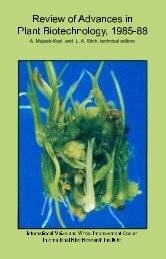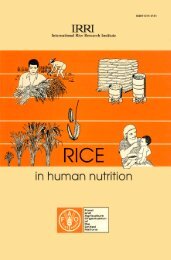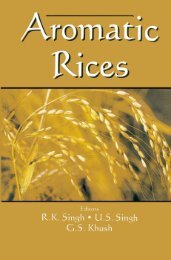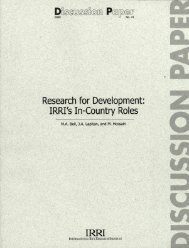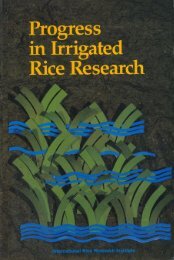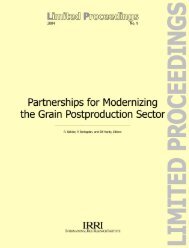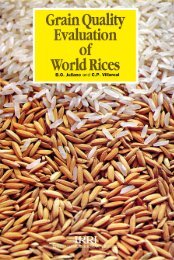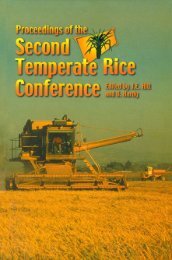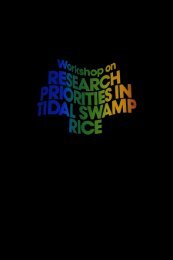An adventure in applied science - IRRI books - International Rice ...
An adventure in applied science - IRRI books - International Rice ...
An adventure in applied science - IRRI books - International Rice ...
- No tags were found...
Create successful ePaper yourself
Turn your PDF publications into a flip-book with our unique Google optimized e-Paper software.
24 History of the <strong>International</strong> <strong>Rice</strong> Research InstituteDur<strong>in</strong>g the 21 years of the Institute’s existence, there have been fivepresidents of the University of the Philipp<strong>in</strong>es and thus, concurrently, membersof the <strong>IRRI</strong> Board of Trustees. S<strong>in</strong>co served through 1962 and was replacedby Carlos P. Romulo, who rema<strong>in</strong>ed until 1968. He was followed by SalvadorP. Lopez, who was on the Board until 1974 and was succeeded by Onofre D.Corpuz, who served through 1978, when he was appo<strong>in</strong>ted M<strong>in</strong>ister ofEducation. Corpuz was followed by Emanuel Soriano, who was succeeded byEdgardo <strong>An</strong>gara <strong>in</strong> 1981.<strong>An</strong>other vary<strong>in</strong>g member on the <strong>IRRI</strong> Board has been the representativefrom the Rockefeller Foundation. Soon after President Rusk was namedsecretary of State by President John F. Kennedy <strong>in</strong> 1961, the foundation’s Boardappo<strong>in</strong>ted Harrar as Rusk’s successor. Despite his heavy duties as president ofthe Rockefeller Foundation, Harrar served as chairman of the <strong>IRRI</strong> Boardthrough the third meet<strong>in</strong>g of the Board, which was held <strong>in</strong> Los Baños on 5February 1962, just before the <strong>in</strong>augural ceremonies of the Institute.Before the fourth meet<strong>in</strong>g of the Board, on 8 January 1963, Harrar haddecided that there could be a conflict of <strong>in</strong>terests <strong>in</strong> his serv<strong>in</strong>g concurrently on<strong>IRRI</strong>’s Board of Trustees and as president of an organization that was a majordonor. He consequently tendered his resignation as chairman and as memberof the Board.To fill the Harrar vacancy, the Rockefeller Foundation designated Albert H.Moseman, who was then director for agricultural <strong>science</strong>s of the foundation.Moseman served until 1966 when he left the foundation at the urg<strong>in</strong>g of theUnited States Agency for <strong>International</strong> Development to accept a key assignment<strong>in</strong> Wash<strong>in</strong>gton. The Rockefeller Foundation’s next representative wasRalph W. Cumm<strong>in</strong>gs, Sr., at the time director of its Indian AgriculturalProgram. In 1968, Cumm<strong>in</strong>gs left the foundation to take a major adm<strong>in</strong>istrativepost at North Carol<strong>in</strong>a State University and Wortman, then director for theagricultural <strong>science</strong>s of the Rockefeller Foundation, was designated as itsrepresentative on <strong>IRRI</strong>’s Board. Wortman served for 2 years until he was madevice president of the foundation, at which time Clarence C. Gray III, associatedirector for agricultural <strong>science</strong>s, was named as the foundation’s representative.Gray is now chairman of the <strong>IRRI</strong> Board of Trustees.The Ford Foundation, on the other hand, has had only two representativeson <strong>IRRI</strong>’s Board. Hill, who was a charter member <strong>in</strong> 1960, cont<strong>in</strong>ued on theBoard until 1978, the longest term of service of any member. When Harrarresigned <strong>in</strong> 1963, Hill was elected chairman and served <strong>in</strong> that capacity, withsteadfast dedication and enthusiasm for 15 years. After Hill retired, of his ownchoos<strong>in</strong>g <strong>in</strong> February 1978, Norman Coll<strong>in</strong>s, who was <strong>in</strong> charge of the FordFoundation’s agricultural program <strong>in</strong> India, was named as the foundation’srepresentative on the Board.The only other ex-officio member of <strong>IRRI</strong>’s Board of Trustees is the Institute’sdirector, of which to date there have been four. I served <strong>in</strong> that capacityfrom 1960 to mid-1972, when I reached the customary retirement age of 65. Iwas followed for a short period by Ralph W. Cumm<strong>in</strong>gs, Sr., who left at theurgent behest of the Government of India and the trustees of the newly formed




